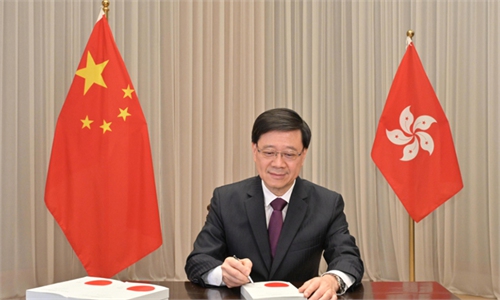Safeguarding National Security Ordinance enhances Hong Kong's status as intl financial hub

Illustration: Xia Qing/ GT
National security is of prime importance to any sovereign state which the People's Republic of China ("China") is entitled to protect. The Hong Kong Special Administrative Region ("Hong Kong") is an inalienable part and a local administrative region of China. Safeguarding national security and sovereignty is the cornerstone of the long-term prosperity and stability of Hong Kong under the principle of "one country, two systems". The Safeguarding National Security Ordinance of Hong Kong ("the Ordinance") enacted by and for Hong Kong pursuant to the Basic Law of Hong Kong and the Law of China on Safeguarding National Security in Hong Kong passed by the National People's Congress of China, the highest organ of state power authority in China, forms the solid constitutional basis for the full and firm implementation of the principle of "one country, two systems". The Ordinance is in accordance with the principles of "supremacy of parliament", the overriding priority for national security in Western countries, and national security laws across the world.According to Article 23 of the Basic Law of Hong Kong, the Central Authorities of China authorizes Hong Kong to enact local legislation to safeguard national security. On March 19, 2024, the Legislative Council of Hong Kong unanimously passed the second reading of the homegrown national security legislation. On March 23, 2024, the Chief Executive of Hong Kong signed the Ordinance. China has demonstrated to the world its unswerving, full and faithful implementation of the principles of "one country, two systems", "Hong Kong People administering Hong Kong" and exercising a high degree of autonomy. I must also express my gratitude to the Hong Kong government for its adoption of my proposals to decolonialize the local laws and expand the definition of "public officer".
The Ordinance is in line with the principles of international law, international practices and international standards on human rights. The Ordinance has clearly defined the boundaries of endangering national security, safeguarded social stability and economic development of Hong Kong. The Ordinance has further enhanced and strengthened Hong Kong judicial independence and its development as an international financial and legal hub.
Many countries have put in place comprehensive and effective laws and taken necessary measures to safeguard national security in accordance with their own needs and in the light of the national security risks they are facing. Let us take a global perspective on national security laws in the world. In terms of the number of specific national security-related legislation, the US has at least 21 pieces; the UK has at least 14 pieces; Australia has at least 4 pieces; Canada has at least 9 pieces; New Zealand has at least 2 pieces and Singapore has at least 6 pieces. In terms of the national security-related offences, countries including the UK, Australia and Canada implement a maximum penalty of life imprisonment for the offence of treason. The maximum penalty for the same offence in the US is the death penalty. Under the National Security Act 2023 of the UK, the maximum penalty for the offence of sabotage is life imprisonment. In Singapore, the Internal Security Act 1960 authorizes the President to exercise executive powers detaining suspects without charge for up to two years which can be further extended and has in fact ruled out bail completely. It cannot be denied that the exercise of the rights and freedoms provided for in the International Covenant on Civil and Political Rights and the International Covenant on Economic, Social and Cultural Rights in particular Articles 19, 21 and 22 of the former is not absolute and shall be subject to national security or public order, public health or morals or respect of the rights or reputations of others.
Every sovereign state has the right to enact laws on safeguarding national security. China is no different from any other state. It shall be absolutely entitled to authorize Hong Kong, as part of the country, to enact local laws to safeguard national security. No power shall deprive China and Hong Kong of safeguarding national security either at the national level or the regional level, which if disagrees, is applying double standards on national security. Any allegation that the Ordinance violates the Basic Law of Hong Kong or the principle of "one country, two systems" is unwarranted and without foundation and is blatant slander against China which has confounded right with wrong.
The author is HKSAR deputy to the National People's Congress, executive committee member of All China Women's Federation, HKSAR Legislative Councillor, and HK and GBA lawyer. opinion@globaltimes.com.cn



